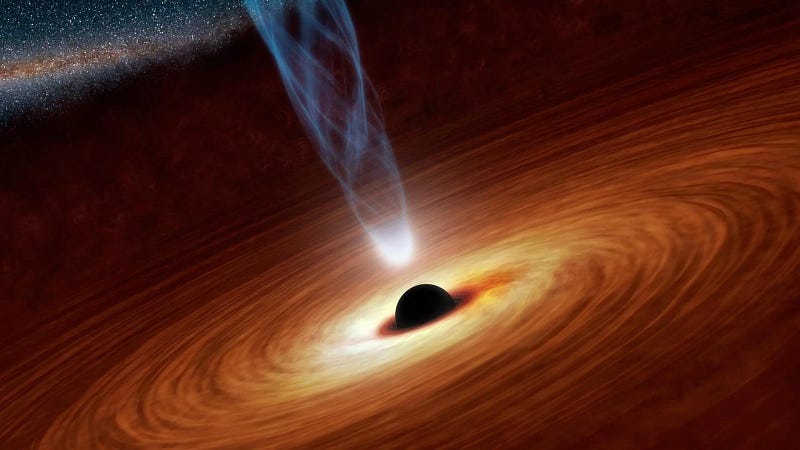Exploring the Reality of Black Holes and the LHC's Role
Written on
Understanding Black Holes and Their Formation
The concept of black holes has intrigued scientists and the public alike, particularly concerning the Large Hadron Collider (LHC) at CERN, located near Geneva, Switzerland. This extraordinary machine, the most powerful particle accelerator on the planet, is engineered to collide protons at unprecedented speeds, which helps researchers delve into the universe's most profound mysteries. However, a significant concern lingers: could the LHC unintentionally generate a black hole that poses a threat to Earth?
This notion has ignited a flurry of discussions, fears, and even outlandish conspiracy theories. This article aims to clarify the origins of this belief, the actual scientific evidence, and why there's no need for alarm regarding the LHC transforming our planet into a cosmic feast.

What Exactly Are Black Holes?
Black holes are regions in space characterized by gravity so intense that not even light can escape their grasp. Typically, they form when a massive star exhausts its nuclear fuel and collapses under its own gravitational pull, resulting in an object of extreme density and strength.
Cultural portrayals often depict black holes as fearsome entities that consume everything in their vicinity. While this makes for captivating stories, the reality is more nuanced. Black holes vary in size, ranging from stellar-mass black holes to supermassive ones residing at the centers of galaxies. The idea that the LHC could generate a black hole connects to advanced theoretical physics, particularly in high-energy particle interactions.
Can the LHC Actually Produce a Black Hole?
In theory, yes — but perhaps not in the manner one might envision. The speculation that the LHC might generate a black hole arises from theories that extend beyond our current understanding, especially concerning extra dimensions.
Certain theories, including string theory, propose that our universe might possess additional spatial dimensions beyond the familiar three. If these dimensions exist, they could alter the behavior of gravity at minuscule scales, allowing for the formation of minuscule black holes, known as micro black holes, during high-energy events like those occurring in the LHC.
These micro black holes would be remarkably tiny, with masses comparable to those of subatomic particles. They differ significantly from the colossal black holes we typically observe in the cosmos. More importantly, should these micro black holes come into existence, they would vanish almost immediately due to a phenomenon called Hawking radiation, named after the renowned physicist Stephen Hawking. This process explains how black holes can gradually lose mass and eventually disappear by emitting radiation.
Why the Alarm?
Despite scientific assurances, the prospect of creating a black hole on Earth has unsettled some individuals. Prior to the LHC's activation, fears — largely fueled by media sensationalism and misinterpretation — circulated that a black hole resulting from the LHC could uncontrollably expand and engulf the planet.
These anxieties were heightened by films and television shows that revel in doomsday scenarios. The mere thought of a black hole materializing on Earth taps into deeply rooted fears concerning the unknown and the risks associated with powerful technologies.
However, the actual situation is far less alarming. The scientific community took these worries seriously and conducted extensive safety assessments before the LHC began operations. The consensus? Even if the LHC were capable of generating micro black holes, they would be innocuous and dissipate instantaneously.
CERN's Safety Protocols
To address public concerns, CERN undertook comprehensive safety evaluations. These investigations involved global experts assessing all conceivable scenarios. They concluded that any black holes produced by the LHC would be so minute and fleeting that they would pose no threat whatsoever.
One critical finding from these studies is that cosmic rays — high-energy particles that naturally bombard Earth from space — frequently create collisions with energies far exceeding those generated in the LHC. If these cosmic events haven’t resulted in hazardous black holes, it is exceedingly improbable that the LHC would either.
Furthermore, if micro black holes were indeed capable of forming in these high-energy collisions, they would have been occurring naturally for billions of years without any disastrous outcomes. This provides a significant reason for scientists' confidence in the LHC's safety.
The Cultural Echo of Black Hole Fears
The speculation surrounding the LHC's potential to create a black hole has significantly influenced popular culture. This narrative plays on our intrigue with cutting-edge science and our trepidation regarding the unknown. Such ideas have permeated films, literature, and video games, often framed within apocalyptic scenarios.
These concerns echo historical anxieties about emerging technologies. For instance, when atomic energy was first harnessed, some feared it could ignite the atmosphere and obliterate the planet. Similar worries exist today regarding artificial intelligence. As science ventures into uncharted territory, it frequently elicits a blend of excitement and apprehension.
So, can the LHC create a black hole? Theoretically, perhaps. However, the type of black hole potentially produced would be exceedingly small, short-lived, and entirely harmless. The rigorous safety evaluations conducted by CERN and physicists worldwide affirm that the LHC poses no genuine threat to our planet.
The LHC has already provided remarkable insights into the universe's nature, including the identification of the Higgs boson. While the notion of generating a black hole may seem like something out of science fiction, it represents just a minor facet of the extraordinary and largely secure scientific journey that the LHC is embarking on. Therefore, you can rest assured that the LHC is paving the way for new discoveries in physics rather than heralding the end of the world.
The first video discusses the potential of the CERN particle accelerator creating a black hole and its implications for Earth.
The second video features Prof. Elizabeth Winstanley discussing black holes at the Large Hadron Collider, providing further insights into this fascinating topic.